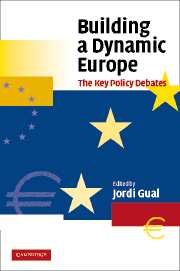Book contents
- Frontmatter
- Contents
- List of figures
- List of tables
- List of contributors
- Acknowledgements
- Introduction
- 1 The new governance of Europe: parliamentary or presidential?
- 2 Improving the performance of the European social model: the welfare state over the individual life cycle
- 3 Integrating and liberalizing the market for network services: gas and electricity
- 4 Challenges for macroeconomic policy in EMU
- 5 The integration of EU banking markets
- Index
- References
1 - The new governance of Europe: parliamentary or presidential?
Published online by Cambridge University Press: 22 September 2009
- Frontmatter
- Contents
- List of figures
- List of tables
- List of contributors
- Acknowledgements
- Introduction
- 1 The new governance of Europe: parliamentary or presidential?
- 2 Improving the performance of the European social model: the welfare state over the individual life cycle
- 3 Integrating and liberalizing the market for network services: gas and electricity
- 4 Challenges for macroeconomic policy in EMU
- 5 The integration of EU banking markets
- Index
- References
Summary
Introduction
Research by economists on institutional aspects of the process of European integration has very much focused either on issues of fiscal federalism or on institutions dealing with monetary policy. A huge literature has developed on these issues (see Baldwin and Wyplosz, 2003 forthcoming). This is not surprising since these are areas in which the expertise of economists is quite developed. In those areas, economic analysis is a powerful tool that brings a strong influence to bear on policy debates.
Currently, the main topic of debate within European policy circles is the Convention on the Future of Europe that was set up by the Laeken summit of the European Council in December 2001. The Convention could play a historic role comparable to the Philadelphia Convention of 1787 that drafted the US constitution. At the heart of the Convention is indeed work on a ‘Constitutional Treaty’ that would merge existing Treaties but most importantly overhaul the institutional system for the governance of Europe. The Convention is reviewing and preparing proposals for improving the mechanisms by which legislative, executive and judicial decision-making is taking place in Europe.
The need to reform the governance of Europe has been voiced repeatedly and increasingly in the past ten years. The looming enlargement of Europe by ten new member states by 2004 decided at the Copenhagen summit (Cyprus, Czech Republic, Estonia, Hungary, Latvia, Lithuania, Malta, Poland, Slovak Republic, Slovenia) has created a sense of urgency.
- Type
- Chapter
- Information
- Building a Dynamic EuropeThe Key Policy Debates, pp. 7 - 38Publisher: Cambridge University PressPrint publication year: 2004



